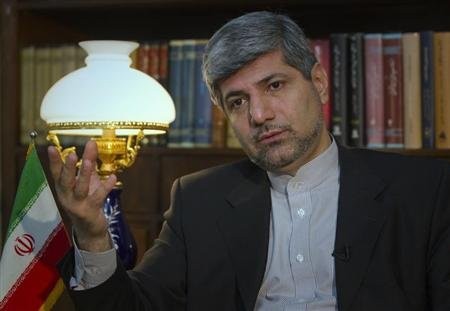(VOVworld) – Next Tuesday, negotiations on Iran’s nuclear development will take place in Kazakhstan between Tehran and the P5+1 group of world powers. A week prior to the event, statements issued by both sides make a breakthrough appear unlikely. VOV comments…
 |
| Iranian Foreign Ministry Spokesman Ramin Mehmanparast speaks with a Reuters correspondent during an interview in Tehran June 29, 2011. REUTERS/Caren Firouz |
On the threshold of the negotiations, Iran has released statements continuing its tough nuclear stance. In a television address, Iran’s supreme leader Ayatollah Ali Khamenei denied any intent to develop nuclear weapons but added that no global power could stop it. The supreme leader reiterated Iran’s stance on weapons of mass destruction - that it depends on moral values and faith, not the opinions of the US or other Western nations. But Alaeddin Boroujerdi, head of the Iranian parliament’s national security and foreign policy committee, said that Iran will never shut down its Fordow uranium enrichment plant. The statement was issued as media in the West reported that the P5+1 -- Britain, China, France, Russia, and the United States plus Germany -- were planning to offer to ease sanctions barring trade in gold and other precious metals with Iran in return for steps to shut down Fordow. Iranian Foreign Ministry spokesperson Ramin Mehmanparast on Monday reiterated that the talks will only be successful if the P5+1 recognizes Iran’s nuclear production rights.
The P5+1 group still insists that Tehran suspend its uranium enrichment at 20%, the level at which a nuclear warhead can be made. The world powers want Iran to move its 20% enriched uranium arsenal out of the country and have demanded that Tehran close the Fordow plant. Once Iran meets these demands, the P5+1 will discuss the possibility of easing sanctions barring gold and other precious metals trade with Iran. The current sanctions by the West, especially the US, are making life in Iran harder. Revenue from Iran’s oil exports dropped 40 billion USD last year. Last month, its oil output decreased to 2.65 million barrels per day from 3.7 million barrels per day in late 2011 when sanctions took effect. Strict restrictions on Iran’s right to participate in the international banking system have caused Iran’s Rial to devalue 45% against the US dollar.
In 2012, Iran and the P5+1 held three rounds of fruitless negotiations, the last one in Russia in June. Neither side has been willing to make any concessions on the issue. The West’s main worry remains Iran’s uranium enrichment at 20%, which could be used either for peaceful purposes or for making nuclear bombs. The West still has doubts about Iran’s development of nuclear bombs under the cover of civil nuclear programs. Tehran has always reiterated that its nuclear projects are for scientific and medical purposes, the legitimate right of any country.
As the meeting in Kazakhstan will take place next week, none has a newer proposal than the outcomes of last June talks in Moscow. It means it’s hard for both Iran and world major powers to reach a common cooperative opportunity for peace.
Hong Van